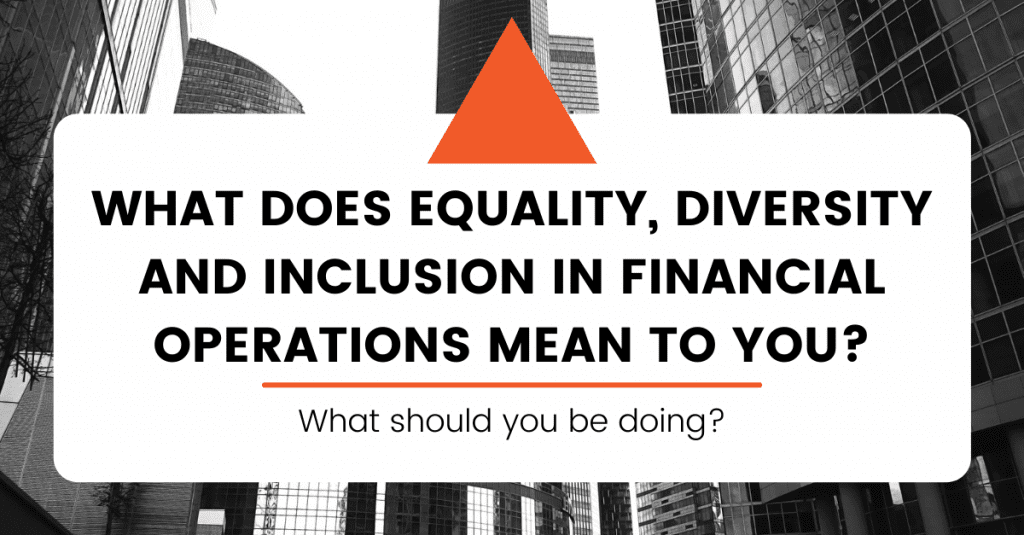What does equality, diversity and inclusion in Financial Operations mean to you?
By definition, equality means fairness for all employees, diversity means respecting the differences that exist amongst us, and inclusion means everyone feels safe and valued at work.
This means we must not discriminate based on our perceptions of our differences. For example, in Financial Operations age or disability cannot influence hiring decisions. Similarly, gender or race should not limit pay and education opportunities.
Whilst definitions of terminology and examples help us begin to understand the obligations organisations and people have, how are they actually experienced in Financial Operations?
We can probably all agree organisations should be enjoyable, productive and protected places. We should feel that we can all succeed within our workplace. Therefore, we all have a part to play in safeguarding and implementing equality, diversity and inclusion.

Adding value to our workforces
Workplaces must value diversity because hiring people from various backgrounds have many benefits for individuals and businesses alike.
Diversity creates multi-dimensional teams and organisational cultures, which can be intricate and complex to manage without equipping Managers with the correct training. Truly embedding diversity in workplaces, however, is to recognise and celebrate the value of our differences.
We all perceive experiences in our own unique, individual way. Hence why workplaces that encourage equality, diversity and inclusion are not only more enjoyable places to work, but also create more successful organisations. Being able to broaden our understanding of things from a perspective different to our own can add significant value to us all personally – and of course, as a consequence, the organisations we work within.
Employees that feel respected at work are happier and more motivated. Workplaces that are known to value diversity attract a wide-ranging, loyal customer base. Organisations that succeed will attract and retain top talent.
Empowering team members to do the right thing
Workplaces can bring together diverse groups of people who may not otherwise socialise within our friendship groups or family lives. To increase diversity, employers can put many policies and processes in place. For example, reviewing the impartiality of recruitment and selection decisions.
However, it is fundamental to acknowledge that both employers and employees are responsible for maintaining diverse and inclusive workplace cultures. We all have a responsibility to value and respect equality, diversity and inclusion at work.
Connecting to our organisations
A variety of people, differences and perspectives makes an organisation diverse. A diverse workforce will not be effective if individual team members do not value, respect and welcome each other to contribute to the organisations. Diversity cannot succeed without inclusion, and organisations cannot succeed without employee engagement. Employees need to feel connected to succeed – whether through a sense of belonging to the team they work within, or an affinity to the organisation’s goals and objectives.
In the same way, we all perceive experiences differently, we all have varied skills and abilities. Inclusive workplaces that focus on valuing and embracing individual capabilities – instead of focusing on limitations, create successful, innovative and collaborative teams, by bringing together and appreciating individual experiences, perspectives and talent.
Accountability
Organisations, teams and colleagues must be held accountable for their actions. As an organisation, the best way to start is to state your commitments to equality, diversity and inclusion within mission statements, values and company goals. These commitments however must be embodied with a culture that follows these values. The best way to combat prejudice and discrimination at work is to speak openly about it at every level; so that team members are clear it will not be tolerated, and everyone feels comfortable in sharing their experiences.
When an equal and inclusive workforce is created and encouraged, people feel confident that their authentic self is valued. By creating and maintaining workplaces that are protected spaces, free from discrimination or bias, we can all succeed by sharing and contributing to collective organisational goals – as well as accomplishing individually.
There’s still time to take part in our research survey until 14th April. Participate here and enter into our prize draw!
